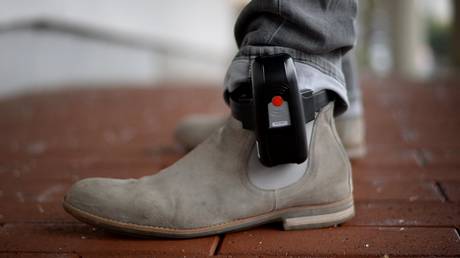
A Kentucky couple have become the latest victims of heavy-handed pandemic enforcement, being outfitted with ankle monitors after refusing to sign a self-quarantine order on testing positive for Covid-19. They’re far from alone.
Elizabeth and Isaiah Linscott were fitted with ankle monitors by Hardin County health authorities last week, as governments take a more intrusive approach to controlling the coronavirus pandemic. The couple had refused to sign an “isolation order,” insisting their problem was not with the idea of self-quarantine but with the way the order was phrased.
The pair were shackled with the monitors less than a week after refusing to sign a pledge to seek approval from the Department of Public Health before traveling by “any public, commercial or health care conveyance such as ambulance, bus, taxi, airplane, train or boat,” Elizabeth Linscott told local media on Sunday. While the isolation order also mandates daily check-ins and self-isolation, Linscott said the line about securing health department approval before leaving the home – even in an ambulance – was the reason they declined the order.
“My part was that if I have to go to the ER, if I have to go to the hospital, I’m not going to wait to get the approval to go,” she told local NBC affiliate WAVE.
Linscott tested positive for coronavirus on July 11, having taken the test as a prerequisite for visiting her parents in Michigan as she did not have any symptoms of the virus. When she refused to sign the form, she was told her case would be “escalated.” Days later, without further warning, over half a dozen people from different law enforcement and health agencies came to the couple’s door brandishing three court orders – one for their daughter – to submit to monitoring.
While the Linscotts are the first reported recipients of an ankle monitor in Hardin County, the city of Louisville has threatened quarantine-breakers with house arrest for months and had already ordered a handful of violators under house arrest for failing to self-quarantine. The couple plans to take Hardin County to court and lamented to local media that they felt like criminals. “We didn’t rob a store. We didn’t steal something. We didn’t hit and run. We didn’t do anything wrong,” Elizabeth said.
Sterner approaches to enforcing coronavirus restrictions are being felt all around the world. Melbourne, Australia deployed hundreds of police officers inside nine public housing towers without so much as warning the inhabitants, in a “hard lockdown” to keep residents inside their apartments earlier this month. Even those who’d tested negative were prohibited from stepping outside, with police assigned to deliver food and other needs for them. The measure was adopted after a few dozen people in the towers tested positive for the virus.
The “hard lockdown” was criticized as transparent economic discrimination, given that the inhabitants of hotspots of similar intensity in the suburbs received advance notice of their own “lockdowns” and were permitted to leave their homes for necessities. Some inhabitants of the housing towers claimed they received expired food or no food at all.
While the last Melbourne tower came out of total lockdown over the weekend, over 100 people living there remain confined, either because they tested positive for coronavirus or have had contact with someone who did.
Attempts to use security forces as lockdown enforcers initially failed in Australia, where “quarantine hotels” for returning citizens in Victoria, patrolled by private security, soon became pandemic hotspots due to mismanagement.
If you like this story, share it with a friend!




